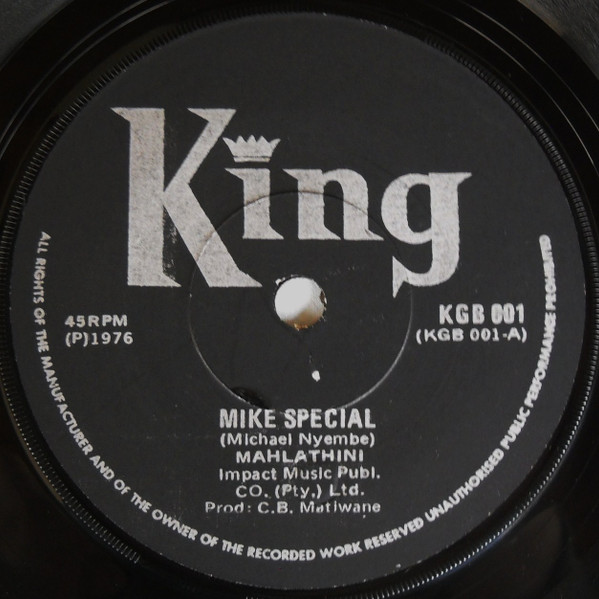


NEWS:
Only 2 days left to hear our September stream - otherwise go to MixCloud to listen but without detailed artist/gig info
Artist Info
|
Mahlathini  Image from Discogs  Simon ‘Mahlathini’ Nkabinde (1937 - 1999) was a South African mbaqanga singer. Known as the "Lion of Soweto" (which the name "Mahlathini" translates to), Nkabinde was the most distinguished of the basso-profundo "groaners" of black South African music and the acknowledged original of a mbaqanga sub-style known as mqashiyo, the indestructible beat. Simon ‘Mahlathini’ Nkabinde (1937 - 1999) was a South African mbaqanga singer. Known as the "Lion of Soweto" (which the name "Mahlathini" translates to), Nkabinde was the most distinguished of the basso-profundo "groaners" of black South African music and the acknowledged original of a mbaqanga sub-style known as mqashiyo, the indestructible beat.Early career and life As a young boy, Nkabinde would sing in choirs at Zulu wedding ceremonies (reference: GMPV 9, Mbaqanga at its Best!). However, when he became a teenager, his voice changed to be more deep than the other teenage boys in his choir. Initially, Nkabinde's parents thought he had been witched, his voice now all but a growl, and took him to a sangoma. Following this, Nkabinde joined his brother Zeph's choir, Alexander Black Mambazo (from which the Ladysmith group took its name). In the mid-1950s, Nkabinde moved to EMI Studios and began recording with female artists such as the Dark City Sisters and the African Jazz Queens. Recording In 1964, talent scout Robert Bopape recruited Nkabinde for commercial recording at the Gallo Record Company studios. Initially, Bopape paired him with a mbaqanga instrumental section, the Makgona Tsohle Band, who have been credited with inventing the mbaqanga style. Bopape also recruited nine women to dance and perform behind Nkabinde and the backing band, calling them the Izintombi zomgQashiyo (the Girls of Mqashiyo); however, later on that year Bopape rearranged the group and recruited 22-year-old Hilda Tloubatla to record in a new female choir to sing backing vocals for Nkabinde. Five women usually sung the main harmonies, and the name Mahotella Queens was originally just a recording name for all female groups to record under (see Mahotella Queens Membership for more details). Throughout the 1960s and early 1970s, Nkabinde, the Mahotella Queens and the Makgona Tsohle Band would have hit songs throughout South Africa, such as early recordings of tracks that brought them to international attention in the 1980s. However, in 1971, Nkabinde fell out with Bopape over his treatment and went back to EMI. The Makgona Tsohle Band moved to record with Abafana Baseqhudeni, and the members of the Mahotella Queens retired to provide for their husbands and children. Controversy In 1975, Gallo Record Company decided to recruit five new women to create 'Mahotella B', a secondary group which recorded under the same names as the original Mahotella Queens. Whilst Nkabinde recorded with a new group, known as The Queens (unconnected with Mahotella Queens) and the Mahlathini Guitar Band, the 'B' Queens recorded with male group Abafana Baseqhudeni. However, after one album produced by the secondary unit, Izibani Zomgqashiyo, the group disbanded. Comeback In 1986, after mbaqanga had almost fallen out of favour, Nkabinde reunited with three of the original 1964-1971 line-up; Hilda Tloubatla, Nobesuthu Mbadu and Mildred Mangxola. They recorded the album Thokozile. After Paul Simon's collaboration with Ladysmith Black Mambazo on his Graceland album and tour, South African music was introduced to the world. Mahlathini and the Mahotella Queens also reunited Nkabinde and the three Queens with the original Makgona Tsohle Band, and the album Thokozile was where they came to international attention. In France, the group became known with the single Kazet. The entire group contributed to the Art of Noise song Yebo!, in 1989. Throughout the 1990s, the band toured the United States, Europe and Asia with success. They celebrated their 30th anniversary in 1994 with the album Stoki Stoki. End of an era The group delivered their last live performance in 1997. Nkabinde's health had worsened in the late 1990s, and the group recorded their last album together in 1998. In April 1999, Nkabinde died of a diabetes-related illness. By the new millennium, all of the members of the Makgona Tsohle Band had died, and the Mahotella Queens decided to retire. However, in 2001, the group decided to return to help keep the music that Nkabinde had popularized alive. Forming a new backing band, the Mahotella Queens continues to record and perform, and paid tribute to Nkabinde and the original Makgona Tsohle Band on their critically acclaimed album Sebai Bai (2001). Read more on Last.fm. User-contributed text is available under the Creative Commons By-SA License; additional terms may apply. Artist biography from last.fm Some other places to look for information: last.fm Discogs MusicBrainz |
